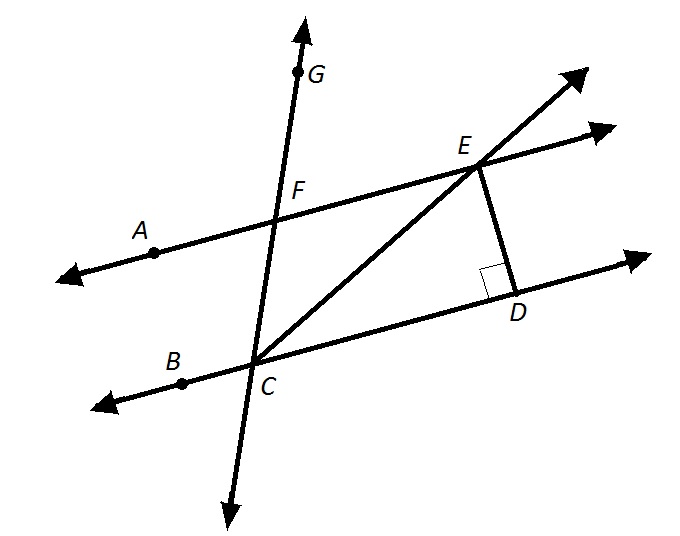All GED Math Resources
Example Questions
Example Question #481 : 2 Dimensional Geometry
Find the the measure of angle B if it is complement of angle A:
If two angles are complementary, that means the sum of their degrees of measure will add up to 90. In order to find the measure of angle B, subtract angle A from 90 like shown:
This gives us a final answer of 72 degrees for angle B.
Example Question #482 : 2 Dimensional Geometry
Find the the measure of angle B if it is complement of angle A:
If two angles are complementary, that means the sum of their degrees of measure will add up to 90. In order to find the measure of angle B, subtract angle A from 90 like shown:
This gives us a final answer of 3 degrees for angle B.
Example Question #483 : 2 Dimensional Geometry
Find the the measure of angle B if it is complement of angle A:
If two angles are complementary, that means the sum of their degrees of measure will add up to 90. In order to find the measure of angle B, subtract angle A from 90 like shown:
This gives us a final answer of 51 degrees for angle B.
Example Question #484 : 2 Dimensional Geometry
Find the the measure of angle B if it is complement of angle A:
If two angles are complementary, that means the sum of their degrees of measure will add up to 90. In order to find the measure of angle B, subtract angle A from 90 like shown:
This gives us a final answer of 37 degrees for angle B.
Example Question #485 : 2 Dimensional Geometry
Find the the measure of angle B if it is complement of angle A:
If two angles are complementary, that means the sum of their degrees of measure will add up to 90. In order to find the measure of angle B, subtract angle A from 90 like shown:
This gives us a final answer of 81 degrees for angle B.
Example Question #56 : Angle Geometry
If an angle measures 
Two angles are classified as complementary if an only if the sum of the angles equals to exactly 90 degrees.
Since we know the measurement of one angle, and we know the rule about complementary angles, let's find the other angle:
The other angle is simply the total sum of both angles minus the given angle.
The total sum of the angles is 

So, we will subtract 

Other angle=
The other angle has a measurement of 
Example Question #1 : Supplementary Angles

Refer to the above diagram.










Example Question #2 : Supplementary Angles
Angles A, B, and C are supplementary. The measure of angle A is 



Since angles A, B, and C are supplementary, their measures add up to equal 180 degrees. Therefore we can set up the equation as such:
-or-
Combine like terms and solve for 
Example Question #2 : Supplementary Angles
Angles A and B are supplementary. The measure of angle A is 


No solution
Since angles A and B are supplementary, thier measurements add up to equal 180 degrees. Therefore we can set up our equation like such:
-or-
Combine like terms and solve for 
Example Question #3 : Supplementary Angles
Angles A, B, and C are supplementary. The measure of angle A is 


No solution
Since angles A, B, and C are supplementary, their measures add up to equal 180 degrees. Therefore we can set up an equation as such:
-or-
Combine like terms and solve for x:
Plug 

All GED Math Resources
























































































